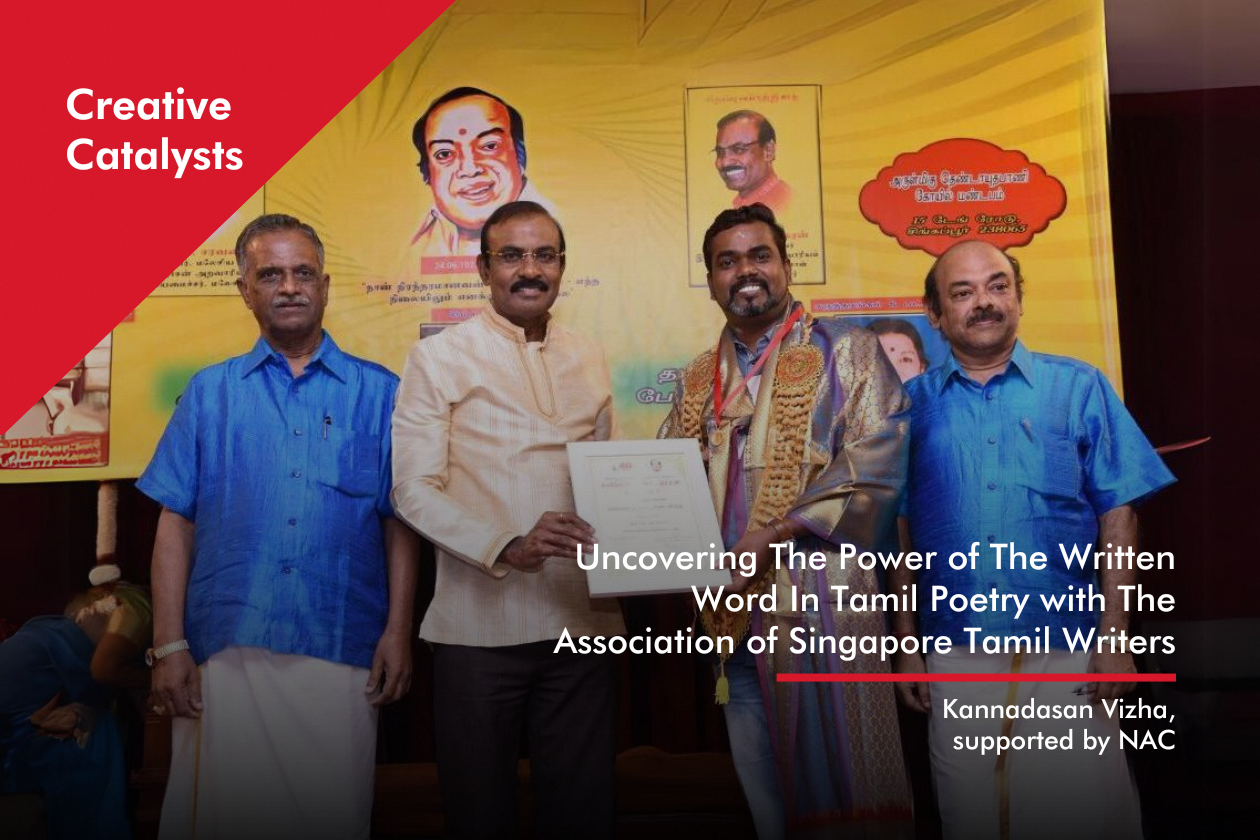
Image Credit: Association of Singapore Tamil Writers
Introduction
Tamil language and literature in Singapore blend tradition and innovation, enriching cultural heritage. Leading this charge in cultivating a renewed appreciation for Tamil tradition is the Association of Singapore Tamil Writers (ASTW).
ASTW was founded in 1977 to nurture young literary talents and improve their Tamil language skills. To sustain interest in the language and reward talent that puts Singapore on the world stage through Tamil literature, ASTW kick-started Kannadasan Vizha in 1993. The festival is in honour of Kannadasan—a celebrated Tamil lyricist, poet and novelist who has contributed heavily to the Tamil film industry over four decades, through some 5,000 songs and 4,000 poems alongside his essays and novels.
Kannadasan Vizha began as an in-person event with special performances and keynote speeches by artists from India, debates on various topics in Tamil, and a singing competition for Tamil Singaporean youth and adults. In 2012, ASTW also started celebrating the contributions of outstanding and promising young writers to our local Tamil literary community with the presentation of the Kannadasan Award.
As a result of the COVID-19 pandemic, ASTW pivoted to holding the event online in 2022—a first in the programme’s history.
With a clear understanding of the importance that the arts hold in different ethnic communities in a multi-racial nation like Singapore, the National Arts Council (NAC) actively supports organisations that encourage and develop young talents in #OurSGArts.
We speak with Mr Aandeappan, Chairman of the ASTW, about Kannadasan, his impact on Tamil poetry and literature, and how the award has spurred Singaporean writers to keep writing.
.png?sfvrsn=b86457d9_2)
Image Credit: Association of Singapore Tamil Writers
Q&A
1. Tell us more about this project.
Kannadasan Vizha is not a one-off project or a one-year project. It began in 1993, and the 2022 edition was the 25th chapter of Kannadasan Vizha, a Silver Jubilee. It was also the first time we held it online!
Kannadasan was a renowned Tamil poet of the 20th Century after Bharatiyar and Bharathidasan. So we thought it would be a splendid idea to introduce him to the next generation and have them learn the mother tongue through him.
2. What was special about the virtual edition of Kannadasan Vizha in 2022?
It was held in the midst of the Covid-19 pandemic, where large groups of people were not allowed to gather for events. Instead of putting a pause on Kannadasan Vizha, we still wanted to push through and connect with the community through technology. For this edition, we held it on Zoom and concurrently streamed it live on YouTube with over 1,000 attendees!
3. How can Kannadasan Vizha encourage the Tamil community in Singapore to keep the language alive and contribute to the literary arts?
The introduction of the Kannadasan Award in 2012 has been a motivating factor for Tamil writers to keep doing great work in literature. We have since started presenting the Kannadasan Award to writers below the age of 40 who have excelled in literature. The winners have expressed their gratitude and told us that the award has motivated them to do better work.
Kannadasan Vizha has also proved to be a gateway for Tamil youth to understand the importance of speaking Tamil, for the late writer’s songs have made the language accessible to people of all ages due to the simplicity of language used. We hope to impress upon the Tamil community the importance of keeping the Tamil language – one of Singapore’s official languages – alive.
4. What is a key takeaway you hope people took away from the festival?
That Kannadasan was not just a poet, but an author who ventured into all genres of Tamil literature, including short stories, novels, essays, plays, screen stories, and dialogues. His passion for the Tamil language has been expressed through efforts to make it accessible to the Tamil community around the world to carry it forward for generations to come.
5. How has NAC played a part in helping you advance your vision for this project and open up new doors to connect with people?
NAC has always been a key institution in our growth for the past 20 years or so. For Kannadasan Vizha, the support from the Council opened up opportunities to invite Kavignar Muthulingam, a renowned poet from India who worked with Kannadasan in the Tamil film industry, to be a keynote speaker at the virtual event. Without NAC’s support, we wouldn’t have achieved success at this level given the challenges of using technology to host the event for the very first time.
Learn about the Council’s efforts to support the growth of the arts scene at: https://www.nac.gov.sg/support/funding-and-schemes


